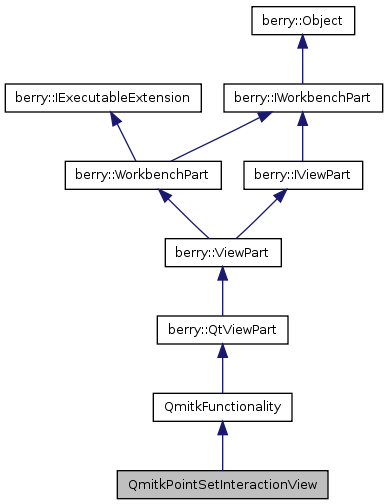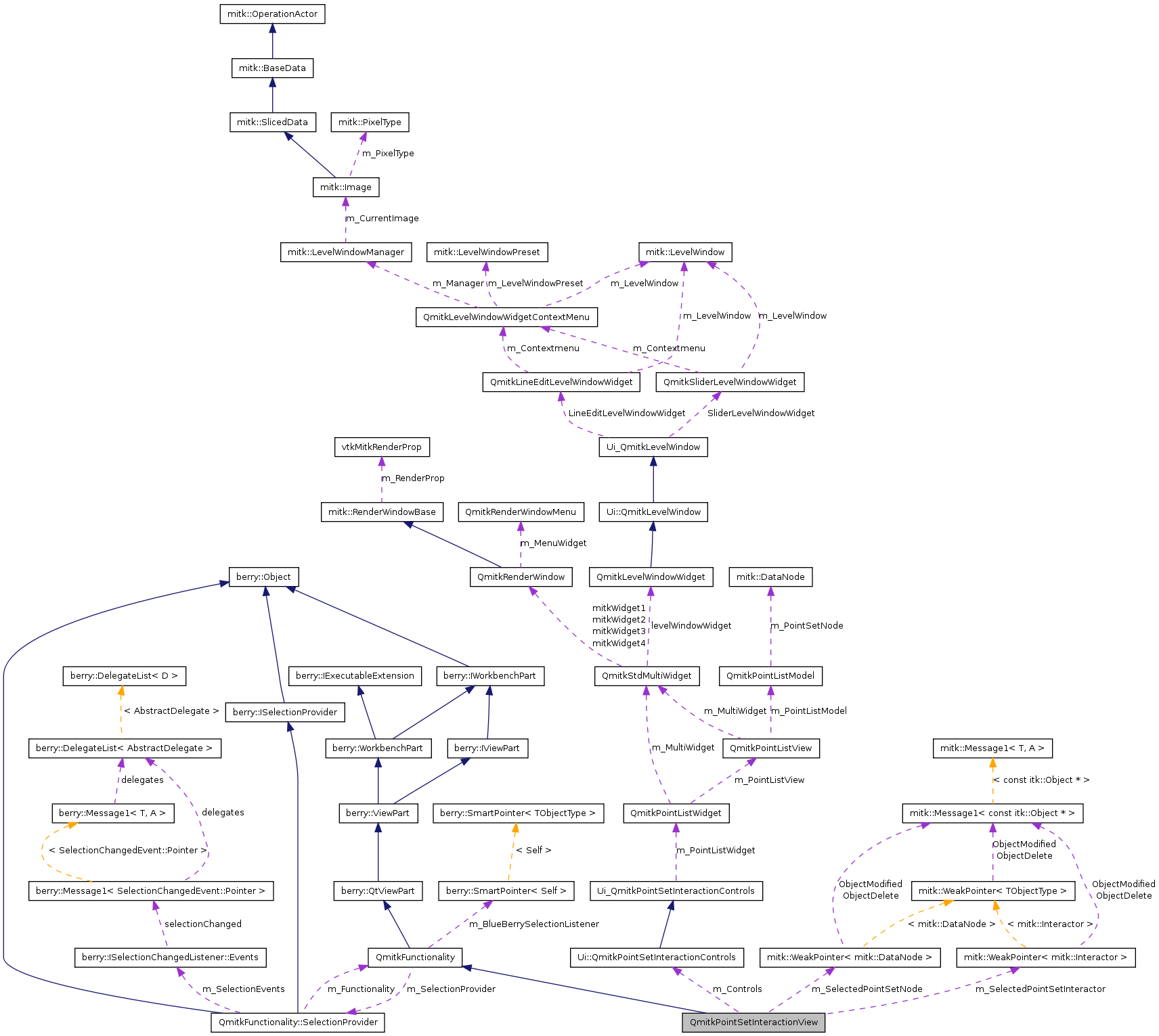QmitkPointSetInteractionView. More...
#include <QmitkPointSetInteractionView.h>


Public Member Functions | |
| QmitkPointSetInteractionView (QObject *parent=0) | |
| virtual | ~QmitkPointSetInteractionView () |
| virtual void | CreateQtPartControl (QWidget *parent) |
| void | OnSelectionChanged (std::vector< mitk::DataNode * > nodes) |
| void | Activated () |
| void | Deactivated () |
| void | NodeChanged (const mitk::DataNode *node) |
| bool | IsExclusiveFunctionality () const |
| virtual void | StdMultiWidgetAvailable (QmitkStdMultiWidget &stdMultiWidget) |
| virtual void | StdMultiWidgetClosed (QmitkStdMultiWidget &stdMultiWidget) |
Protected Slots | |
| void | OnAddPointSetClicked () |
Protected Attributes | |
| Ui::QmitkPointSetInteractionControls * | m_Controls |
| mitk::WeakPointer< mitk::DataNode > | m_SelectedPointSetNode |
| mitk::WeakPointer < mitk::Interactor > | m_SelectedPointSetInteractor |
Definition at line 35 of file QmitkPointSetInteractionView.h.
| QmitkPointSetInteractionView::QmitkPointSetInteractionView | ( | QObject * | parent = 0 ) |
Definition at line 33 of file QmitkPointSetInteractionView.cpp.
: m_Controls(0) { }
| QmitkPointSetInteractionView::~QmitkPointSetInteractionView | ( | ) | [virtual] |
Definition at line 39 of file QmitkPointSetInteractionView.cpp.
{
}
| void QmitkPointSetInteractionView::Activated | ( | ) | [virtual] |
Only called when IsExclusiveFunctionality() returns true.
Reimplemented from QmitkFunctionality.
Definition at line 51 of file QmitkPointSetInteractionView.cpp.
References QmitkFunctionality::GetDataManagerSelection(), and OnSelectionChanged().
{
// emulate datamanager selection
std::vector<mitk::DataNode*> selection = this->GetDataManagerSelection();
this->OnSelectionChanged( selection );
}
| void QmitkPointSetInteractionView::CreateQtPartControl | ( | QWidget * | parent ) | [virtual] |
Implements berry::QtViewPart.
Definition at line 43 of file QmitkPointSetInteractionView.cpp.
References m_Controls, Ui_QmitkPointSetInteractionControls::m_PbAddPointSet, OnAddPointSetClicked(), and Ui_QmitkPointSetInteractionControls::setupUi().
{
m_Controls = new Ui::QmitkPointSetInteractionControls;
m_Controls->setupUi(parent);
m_Controls->m_PbAddPointSet->connect( m_Controls->m_PbAddPointSet, SIGNAL( clicked() )
, this, SLOT( OnAddPointSetClicked() ) );
}
| void QmitkPointSetInteractionView::Deactivated | ( | ) | [virtual] |
Only called when IsExclusiveFunctionality() returns true.
Reimplemented from QmitkFunctionality.
Definition at line 58 of file QmitkPointSetInteractionView.cpp.
References QmitkPointListWidget::DeactivateInteractor(), m_Controls, Ui_QmitkPointSetInteractionControls::m_PointListWidget, and OnSelectionChanged().
{
// emulate empty selection
std::vector<mitk::DataNode*> selection;
this->OnSelectionChanged( selection );
m_Controls->m_PointListWidget->DeactivateInteractor(true);
}
| bool QmitkPointSetInteractionView::IsExclusiveFunctionality | ( | ) | const [virtual] |
Some functionalities need to add special interactors, removes the crosshair from the stdmultiwidget, etc. In this case the functionality has to tidy up when changing to another functionality which also wants to change the "default configuration". In the old Qt3-based version of MITK, two functionalities could never be opened at the same time so that the methods Activated() and Deactivated() were the right place for the functionalitites to add/remove their interactors, etc. This is still true for the new MITK Workbench, but as there can be several functionalities visible at the same time, the behaviour concerning when Activated() and Deactivated() are called has changed:
1. Activated() and Deactivated() are only called if IsExclusiveFunctionality() returns true
2. If only one standalone functionality is or becomes visible, Activated() will be called on that functionality
3. If two or more standalone functionalities are visible, Activated() will be called on the functionality that receives focus, Deactivated() will be called on the one that looses focus, gets hidden or closed
As a consequence of 1. if you overwrite IsExclusiveFunctionality() and let it return false, you signalize the MITK Workbench that this functionality does nothing to the "default configuration" and can easily be visible while other functionalities are also visible.
By default the method returns true.
Reimplemented from QmitkFunctionality.
Definition at line 136 of file QmitkPointSetInteractionView.cpp.
{
return true;
}
| void QmitkPointSetInteractionView::NodeChanged | ( | const mitk::DataNode * | ) | [virtual] |
Called when a DataStorage Changed event was thrown. May be reimplemented by deriving classes.
Reimplemented from QmitkFunctionality.
Definition at line 141 of file QmitkPointSetInteractionView.cpp.
References mitk::DataNode::GetName(), m_Controls, Ui_QmitkPointSetInteractionControls::m_CurrentPointSetLabel, and m_SelectedPointSetNode.
{
if(node == m_SelectedPointSetNode && m_Controls->m_CurrentPointSetLabel->text().toStdString() != node->GetName())
{
m_Controls->m_CurrentPointSetLabel->setText(QString::fromStdString(node->GetName()));
}
}
| void QmitkPointSetInteractionView::OnAddPointSetClicked | ( | ) | [protected, slot] |
Definition at line 66 of file QmitkPointSetInteractionView.cpp.
References QmitkFunctionality::FireNodesSelected(), QmitkFunctionality::GetDefaultDataStorage(), mitk::FloatProperty::New(), mitk::StringProperty::New(), mitk::DataNode::New(), mitk::PointSet::New(), and OnSelectionChanged().
Referenced by CreateQtPartControl().
{
//Ask for the name of the point set
bool ok = false;
QString name = QInputDialog::getText( QApplication::activeWindow()
, "Add point set...", "Enter name for the new point set", QLineEdit::Normal, "PointSet", &ok );
if ( ! ok || name.isEmpty() )
return;
//
//Create a new empty pointset
//
mitk::PointSet::Pointer pointSet = mitk::PointSet::New();
//
// Create a new data tree node
//
mitk::DataNode::Pointer pointSetNode = mitk::DataNode::New();
//
// fill the data tree node with the appropriate information
//
pointSetNode->SetData( pointSet );
pointSetNode->SetProperty( "name", mitk::StringProperty::New( name.toStdString() ) );
pointSetNode->SetProperty( "opacity", mitk::FloatProperty::New( 1 ) );
pointSetNode->SetColor( 1.0, 1.0, 0.0 );
//
// add the node to the ds
//
this->GetDefaultDataStorage()->Add(pointSetNode);
// make new selection and emulate selection for this
std::vector<mitk::DataNode*> selection;
selection.push_back( pointSetNode );
this->FireNodesSelected( selection );
this->OnSelectionChanged( selection );
}
| void QmitkPointSetInteractionView::OnSelectionChanged | ( | std::vector< mitk::DataNode * > | ) | [virtual] |
Called when the selection in the workbench changed
Reimplemented from QmitkFunctionality.
Definition at line 102 of file QmitkPointSetInteractionView.cpp.
References mitk::DataNode::GetData(), mitk::DataNode::GetName(), m_Controls, Ui_QmitkPointSetInteractionControls::m_CurrentPointSetLabel, Ui_QmitkPointSetInteractionControls::m_PointListWidget, m_SelectedPointSetNode, and QmitkPointListWidget::SetPointSetNode().
Referenced by Activated(), Deactivated(), and OnAddPointSetClicked().
{
mitk::DataNode* selectedNode = 0;
if(nodes.size() > 0)
selectedNode = nodes.front();
mitk::PointSet* pointSet = 0;
if(selectedNode)
pointSet = dynamic_cast<mitk::PointSet*> ( selectedNode->GetData() );
//if( m_SelectedPointSetInteractor.IsNotNull() )
//{
// mitk::GlobalInteraction::GetInstance()->RemoveInteractor( m_SelectedPointSetInteractor );
// m_SelectedPointSetInteractor = NULL;
//}
if (pointSet /*&& this->IsActivated()*/)
{
m_SelectedPointSetNode = selectedNode;
m_Controls->m_CurrentPointSetLabel->setText(QString::fromStdString(selectedNode->GetName()));
m_Controls->m_PointListWidget->SetPointSetNode(selectedNode);
// add interactor
//mitk::PointSetInteractor::Pointer _Interactor = mitk::PointSetInteractor::New("pointsetinteractor", selectedNode);
//mitk::GlobalInteraction::GetInstance()->AddInteractor( _Interactor );
//m_SelectedPointSetInteractor = _Interactor;
}
else
{
m_Controls->m_CurrentPointSetLabel->setText("None");
m_Controls->m_PointListWidget->SetPointSetNode(0);
}
}
| void QmitkPointSetInteractionView::StdMultiWidgetAvailable | ( | QmitkStdMultiWidget & | stdMultiWidget ) | [virtual] |
Called when a StdMultiWidget is available. Should not be used anymore, see GetActiveStdMultiWidget()
Reimplemented from QmitkFunctionality.
Definition at line 149 of file QmitkPointSetInteractionView.cpp.
References m_Controls, Ui_QmitkPointSetInteractionControls::m_PointListWidget, and QmitkPointListWidget::SetMultiWidget().
{
if(m_Controls)
m_Controls->m_PointListWidget->SetMultiWidget( &stdMultiWidget );
}
| void QmitkPointSetInteractionView::StdMultiWidgetClosed | ( | QmitkStdMultiWidget & | stdMultiWidget ) | [virtual] |
Called when a StdMultiWidget is available. Should not be used anymore, see GetActiveStdMultiWidget()
Reimplemented from QmitkFunctionality.
Definition at line 155 of file QmitkPointSetInteractionView.cpp.
References m_Controls, Ui_QmitkPointSetInteractionControls::m_PointListWidget, and QmitkPointListWidget::SetMultiWidget().
{
if(m_Controls)
m_Controls->m_PointListWidget->SetMultiWidget( 0 );
}
Definition at line 53 of file QmitkPointSetInteractionView.h.
Referenced by CreateQtPartControl(), Deactivated(), NodeChanged(), OnSelectionChanged(), StdMultiWidgetAvailable(), and StdMultiWidgetClosed().
mitk::WeakPointer<mitk::Interactor> QmitkPointSetInteractionView::m_SelectedPointSetInteractor [protected] |
Definition at line 55 of file QmitkPointSetInteractionView.h.
Definition at line 54 of file QmitkPointSetInteractionView.h.
Referenced by NodeChanged(), and OnSelectionChanged().
 1.7.2
1.7.2